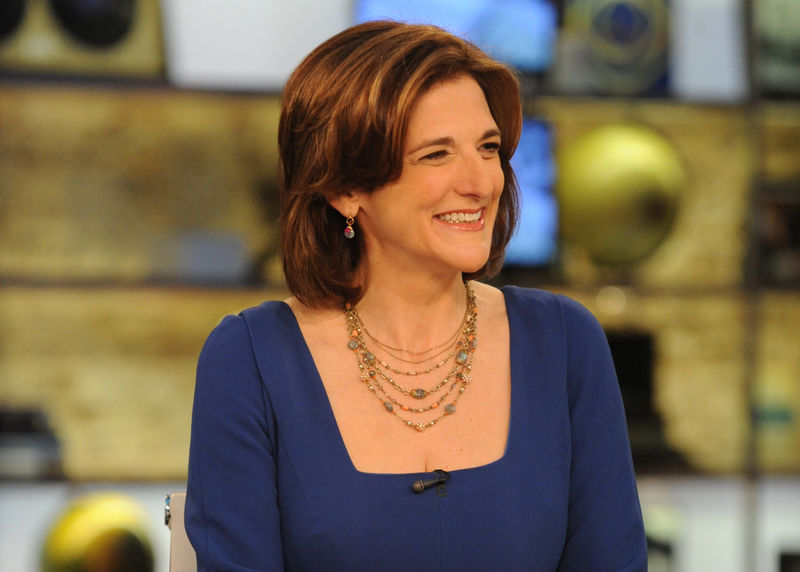By Mark Miller
CHICAGO (Reuters) - Jill Schlesinger got her start on Wall Street, and that is where she learned a lot of what she knows about the financial world. But she has built a career dishing out personal finance advice by pulling back the curtain on myths about investing, and showing how average people can make a solid plan for retirement.
Schlesinger reports on business for CBS News, hosts a national weekly radio program on personal finance and writes a syndicated newspaper column. She is also a certified financial planner.
In her new book, "The Dumb Things Smart People Do with Their Money" (Ballantine Books), she confesses to some of her own big money mistakes, and lays out 13 of the most costly blunders people make.
One of her prime candidates for potential danger is buying complex or expensive financial products like variable annuities, precious metals and reverse mortgages. She also delves in to the debate on how to protect investors from conflicted financial advice offered by brokers with insurance or investment firms, a.k.a. the fiduciary standard battle. Or, as she summarizes it in the book: “Taking advice from someone who is trying, first and foremost, to sell you something that will make him or her money, rather than help you."
The big thing she has learned along the way? “We don’t need to be geniuses with our money - we just need to take control and not act like dopes.”
Schlesinger has found that smart people can be their own worst enemy when it comes to money. There is some tough, very valuable love in the book, but Schlesinger makes it all go down painlessly with her trademark humor, empathy and openness about her own money mistakes.
I spoke with Schlesinger recently about the big errors people continue to make when it comes to saving and investing for retirement.
Q: One of the fun things about your book is your own money confessions. A big one was your failure to time the market during the early 2000s as the stock market was starting to recover from the dot-com bust - you write that you were slow to invest in riskier growth companies, which cost you a good bit of money as the market came back. But the real lesson here concerns the futility of trying to time the market, right?
A: I was trained as a trader - my first job on Wall Street was trading commodities on the floor of the COMEX. With that background, I used to think that I understood highs and lows better than the vast majority of the investing world. And during the early 2000s, I was basking in the glow of my decision to partially sell out of fast-growth tech stocks at the height of the bubble. But when the market started to recover in 2002, I waited way too long to get back in, and wound up with a lot of egg on my face.
When you have a public persona like I do, you can really start to believe your own baloney - and it can be really difficult to get back into the market at the right time.
Q: What’s the big lesson here - everyone should be passive investors?
A: Right. Maintain a diversified portfolio, with the allocation between stocks, bonds, cash and so on set according to match the time when you will need the money. Take as little risk as possible to reach your goals. No one is smart enough to beat the market - no one. Smart people can have this tendency to think that they will be able to "beat" everyone else.
If you want to have some fun money to play with in the market, that’s fine - but it must literally be the money you don’t care about. It’s like shooting craps in Las Vegas - the only difference is, there, you get a free drink.
Q: Another thing I like about your book is your discussion of first priorities - things people can do to clean up their financial affairs without the help of a planner.
A: Right, this isn’t a book about debt, but in the hierarchy of things to get done first, the big items are fairly straightforward. Start by paying down consumer debt and establish an emergency reserve fund to cover six to 12 months of expenses. Then, put enough into your retirement account to capture any match from your employer. I used to be more severe on this point, advising people not to save a single dollar until their credit cards were paid off. But I’ve softened up a bit on that, because if you can get in the habit of saving, you should.
Q: We often hear the mantra about the importance of saving for retirement, but it is not always the first thing people should do to get their financial house in order - and that hierarchy is just good common sense.
A: If I can help make a few people more sane about money, I’ve done my job!
(The opinions expressed here are those of the author, a columnist for Reuters.)

(Reporting and writing by Mark Miller in Chicago; Editing by Matthew Lewis)